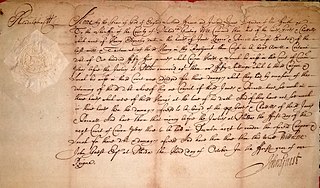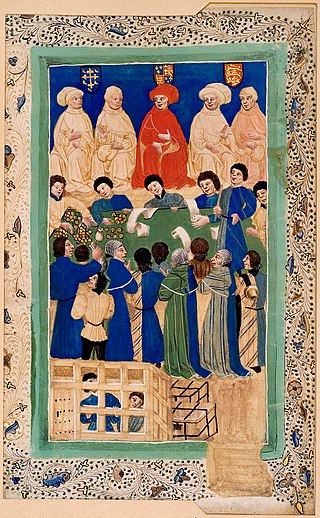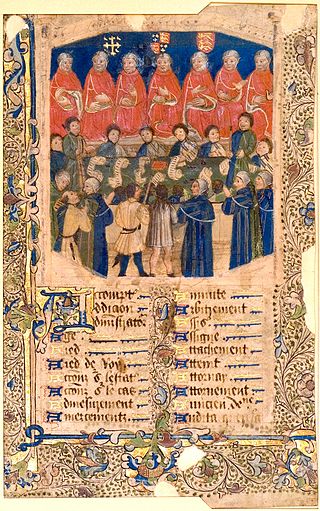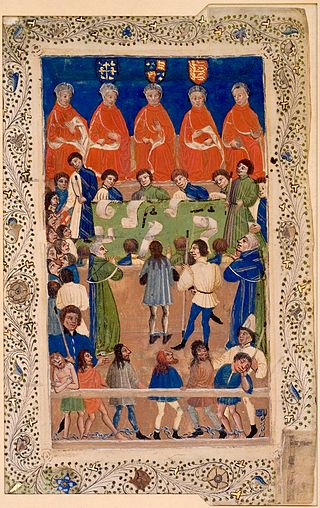Related Research Articles

In the field of jurisprudence, equity is the particular body of law, developed in the English Court of Chancery, with the general purpose of providing legal remedies for cases wherein the common law is inflexible and cannot fairly resolve the disputed legal matter. Conceptually, equity was part of the historical origins of the system of common law of England, yet is a field of law separate from common law, because equity has its own unique rules and principles, and was administered by courts of equity.

In common law, a writ is a formal written order issued by a body with administrative or judicial jurisdiction; in modern usage, this body is generally a court. Warrants, prerogative writs, subpoenas, and certiorari are common types of writs, but many forms exist and have existed.
A writ of prohibition is a writ directing a subordinate to stop doing something the law prohibits. This writ is often issued by a superior court to the lower court directing it not to proceed with a case which does not fall under its jurisdiction.
In the English-American common law, quo warranto is a prerogative writ issued by a court which orders someone to show what authority they have for exercising some right, power, or franchise they claim to hold. The writ of quo warranto still exists in the United States, although it is uncommon, but it has been abolished in England and Wales. Quo warranto is also used, with slightly different effect, in the Philippines.

The Exchequer of Pleas, or Court of Exchequer, was a court that dealt with matters of equity, a set of legal principles based on natural law and common law in England and Wales. Originally part of the curia regis, or King's Council, the Exchequer of Pleas split from the curia in the 1190s to sit as an independent central court. The Court of Chancery's reputation for tardiness and expense resulted in much of its business transferring to the Exchequer. The Exchequer and Chancery, with similar jurisdictions, drew closer together over the years until an argument was made during the 19th century that having two seemingly identical courts was unnecessary. As a result, the Exchequer lost its equity jurisdiction. With the Judicature Acts, the Exchequer was formally dissolved as a judicial body by an Order in Council on 16 December 1880.
The forms of action were the different procedures by which a legal claim could be made during much of the history of the English common law. Depending on the court, a plaintiff would purchase a writ in Chancery which would set in motion a series of events eventually leading to a trial in one of the medieval common law courts. Each writ entailed a different set of procedures and remedies which together amounted to the "form of action".
A writ of coram nobis is a legal order allowing a court to correct its original judgment upon discovery of a fundamental error that did not appear in the records of the original judgment's proceedings and that would have prevented the judgment from being pronounced. The term coram nobis is Latin for "before us" and the meaning of its full form, quae coram nobis resident, is "which [things] remain in our presence". The writ of coram nobis originated in the courts of common law in the English legal system during the sixteenth century.

Henry of Bracton, also known as Henry de Bracton, Henricus Bracton, Henry Bratton, and Henry Bretton, was an English cleric and jurist.
Ejectment is a common law term for civil action to recover the possession of or title to land. It replaced the old real actions and the various possessory assizes where boundary disputes often featured. Though still used in some places, the term is now obsolete in many common law jurisdictions, in which possession and title are sued by the actions of eviction and quiet title, respectively.

Bushel’s Case (1670) 124 E.R. 1006, also spelled Bushell's Case, is a famous English decision on the role of juries. It established beyond question the independence of the jury. It also confirmed that the Court of Common Pleas could issue a writ of habeas corpus in ordinary criminal cases.
In archaic English law, a cape was a judicial writ concerning a plea of lands and tenements; so called, as most writs are, from the word which carried the chief intention of the writ.
Casu proviso was a writ of entry, given by the Statute of Gloucester, in cases where a tenant in dowry transfers property to another in fee, or for term of life, or in tail. The writ lies for him in reversion against the transfer.
A cessavit was a writ in English law, originating in Stat. 6 Edw. I., given by statute to recover lands when the tenant has for two years failed to perform the conditions of his tenure. It was abolished in 3 and 4 Wm. IV. The forms and species of this writ were various; such as, cessavit de cantaria, cessavit de feodifirma, and cessavit per biennium.

The Court of Common Pleas, or Common Bench, was a common law court in the English legal system that covered "common pleas"; actions between subject and subject, which did not concern the king. Created in the late 12th to early 13th century after splitting from the Exchequer of Pleas, the Common Pleas served as one of the central English courts for around 600 years. Authorised by Magna Carta to sit in a fixed location, the Common Pleas sat in Westminster Hall for its entire existence, joined by the Exchequer of Pleas and Court of King's Bench.

The Bill of Middlesex was a legal fiction used by the Court of King's Bench to gain jurisdiction over cases traditionally in the remit of the Court of Common Pleas. Hinging on the King's Bench's remaining criminal jurisdiction over the county of Middlesex, the Bill allowed it to take cases traditionally in the remit of other common law courts by claiming that the defendant had committed trespass in Middlesex. Once the defendant was in custody, the trespass complaint would be quietly dropped and other complaints would be substituted.

The Court of King's Bench, formally known as The Court of the King Before the King Himself, was a court of common law in the English legal system. Created in the late 12th to early 13th century from the curia regis, the King's Bench initially followed the monarch on his travels. The King's Bench finally joined the Court of Common Pleas and Exchequer of Pleas in Westminster Hall in 1318, making its last travels in 1421. The King's Bench was merged into the High Court of Justice by the Supreme Court of Judicature Act 1873, after which point the King's Bench was a division within the High Court. The King's Bench was staffed by one Chief Justice and usually three Puisne Justices.

Slade's Case was a case in English contract law that ran from 1596 to 1602. Under the medieval common law, claims seeking the repayment of a debt or other matters could only be pursued through a writ of debt in the Court of Common Pleas, a problematic and archaic process. By 1558 the lawyers had succeeded in creating another method, enforced by the Court of King's Bench, through the action of assumpsit, which was technically for deceit. The legal fiction used was that by failing to pay after promising to do so, a defendant had committed deceit, and was liable to the plaintiff. The conservative Common Pleas, through the appellate court the Court of Exchequer Chamber, began to overrule decisions made by the King's Bench on assumpsit, causing friction between the courts.

The Statute of Westminster of 1285, also known as the Statute of Westminster II or the Statute of Westminster the Second, like the Statute of Westminster 1275, is a code in itself, and contains the famous clause De donis conditionalibus, one of the fundamental institutes of the medieval land law of England.
Secundum formam statuti is a legal term which means: "according to the form of the statute" 1.
References
- ↑ third entry in: http://aalt.law.uh.edu/H4/CP40no605/bCP40ono605dorses/IMG_1167.htm; Elias Tagge, as plaintiff
![]() This article incorporates text from a publication now in the public domain : Chambers, Ephraim, ed. (1728). "Casu consimili". Cyclopædia, or an Universal Dictionary of Arts and Sciences (1st ed.). James and John Knapton, et al.
This article incorporates text from a publication now in the public domain : Chambers, Ephraim, ed. (1728). "Casu consimili". Cyclopædia, or an Universal Dictionary of Arts and Sciences (1st ed.). James and John Knapton, et al.